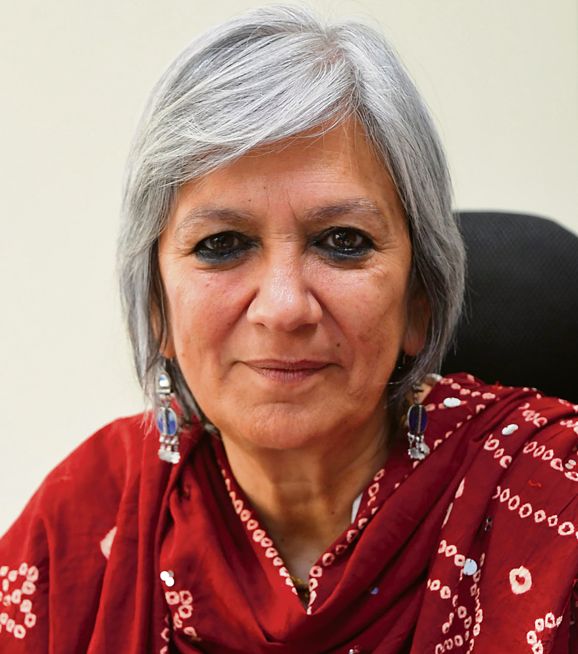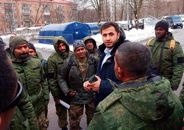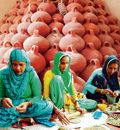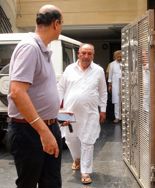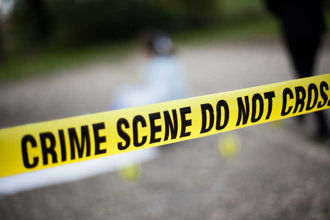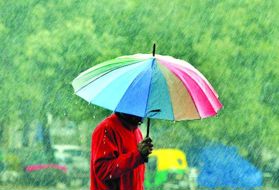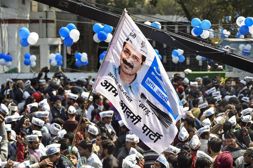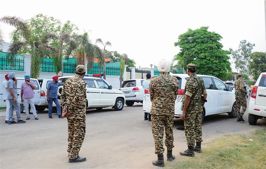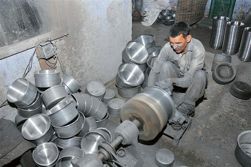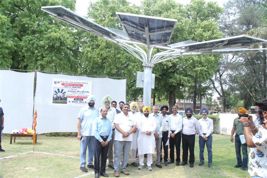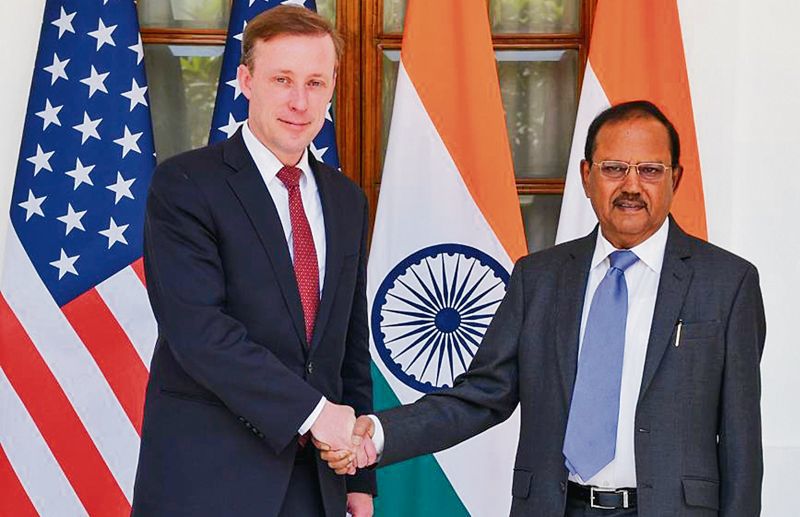
ALLIES: NSA Ajit Doval (right) with his US counterpart Jake Sullivan during a meeting in New Delhi this week. It is important to ask what kind of a relationship India wants from the US — and vice-versa. PTI
Editor-in-Chief
PRIME Minister Narendra Modi’s stranglehold on politics and the BJP’s Hindutva citadel have been both shaken and stirred by the recent election results, and the coming monsoon session of the 18th Lok Sabha will surely be a teaser of things to come.
But in the great game that is being played out in the rest of the world, in which the US, Russia and China remain key poles, it will be interesting to see how these countries respond to India’s assertion that it is a stabilising power in a chaotic region.
With Chinese troops still sitting on the LAC, PM Modi probably believes it’s better to avoid the avoidable pleasantries.
First things first. Earlier this week, National Security Adviser (NSA) Ajit Doval — the powerful 79-year-old former intelligence chief, now in his third term as NSA — and his US counterpart, Jake Sullivan, met in New Delhi to underline the importance of the transfer of critical technologies from the US to India.
The important thing about this meeting, however, is the one that happened before the delegation-level talks — when Doval and Sullivan met without aides, without note-takers or anyone else in the room, for at least 30-40 minutes. For sure, there would have been recording devices embedded in the lamp-base or behind expensive art work — we all know this from the James Bond movies we are addicted to — and both would have later related the key points of their conversation to their respective officers.
But make no mistake. No conversation on critical technologies, known as iCET, or the call on PM Modi or the half-hour ‘chai pe charcha’ between Sullivan and External Affairs Minister S Jaishankar would have been as important as this one (note that Kurt Campbell, the US Deputy Secretary of State and America’s top diplomat on China, was also in town).
And that is because when all the bells and whistles recede into the background — including the fine dining at Delhi’s beautifully appointed Hyderabad House, the venue for all diplomatic engagements at the highest level — it is the exercise of hard power that courteously asserts itself.
Some of that conversation definitely revolved around India’s alleged attempt to kill Gurpatwant Singh Pannun, a pro-Khalistan activist in New York. According to the US indictment, Indian national Nikhil Gupta — whom the Czechs gave up to the Americans even as Doval and Sullivan talked in Delhi — was allegedly hired by a co-conspirator called ‘CC-1’, whom The Washington Post recently revealed to be an official of India’s external intelligence agency, R&AW, by the name of Vikram Yadav.
We know all this by now. We also know that the Indians, in an attempt to mollify the Americans — when the smelly garbage was hitting the fan — repatriated Yadav to his parent cadre, the CRPF. He is now believed to be back in Chhattisgarh, allegedly swatting both flies and would-be Maoists.
The alleged hit job was supposed to have been undertaken exactly a year ago, on June 22 — of course, it was foiled by the Americans, which is how Pannun is still alive, probably chomping on bagels-and-cheese or even aloo ka paratha back home in New York. In the recent Lok Sabha elections, he was reduced to sending Punjabi voice notes urging people to support Sikh radicals like Amritpal Singh; sure, he won from Khadoor Sahib, but that had far more to do with Punjab’s forever angst against Delhi, rather than any persuaded emotions of separatism. The point is, dead or alive, Pannun is irrelevant.
Sullivan and Doval would have gone all over this, in their own way. Doval is not the type to apologise — no self-respecting intelligence officer ever does, and why should he, pray — but all sides know that in this high-stakes game in which all nations measure one another up for brains, brawn and potential, India is a quarter of a step down today.
But the Indians also have a long memory. There is the matter of Rabinder Singh, the R&AW agent who was exfiltrated by the Americans in 2004. No one in Delhi has quite forgotten how he was smuggled out, via Nepal, even though both countries had, by then, sworn to be ‘natural allies’. Those of you who are spy movie addicts should watch Vishal Bhardwaj’s Khufiya today, if you haven’t already — and know that the real story is dirtier, sadder and far less glamorous.
The more important question today, as Modi has taken charge for the third time, is what kind of a relationship does India want from the US — and vice-versa. And then there is the small matter of New Delhi asserting its relationship with Russia, both because it continues to get cheap oil from there — which it not so quietly re-exports to the refineries of Europe, which are desperate for cheap Russian oil they have been prohibited from buying since the Russian war against Ukraine began two years ago — and its continued dependence on Russian weapons. It’s also why, as Delhi has made clear, it is walking the middle path on Ukraine.
Thus, it seems more than likely that Modi will travel in October to Kazan in the heart of Russia — a city that symbolises the 1552 victory of the Russian Orthodox Tsar, Ivan the Terrible, over the Mongols and the massive expansion of Islam, like no other — for the BRICS summit, the acronym for the Brazil-Russia-India-China-South Africa organisation, that has now been expanded to incorporate players like the UAE and Saudi Arabia. Remember that Ivan’s victory took place only 26 years after Babur becomes the Emperor of Hindustan in 1526.
Modi, sort of, owes it to Vladimir Putin — the PM hasn’t visited Moscow since Putin came to Delhi in December 2021 — and especially since Modi isn’t going to the China-led Shanghai Cooperation Organisation’s summit in Astana, Kazakhstan, in July. Putin will be in Astana, of course — Kazakhstan is part of Russia’s near-abroad — as will Xi Jinping. But with Chinese troops still sitting on the LAC with India, Modi probably believes it’s better to avoid the avoidable pleasantries.
Guess who will be watching closely when Modi goes to Kazan? From Washington DC to Delhi, via Moscow and Beijing, the great game is certainly alive and well.
Join Whatsapp Channel of The Tribune for latest updates.






